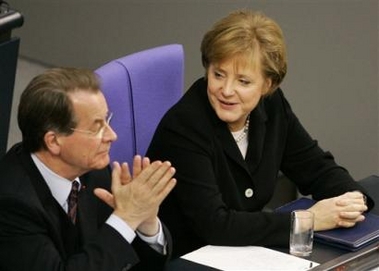|
Merkel, facing Iraq hostage crisis, charts course for Germany
(AFP)
Updated: 2005-12-01 09:26 "Who would have thought that the highest governmental office would be given
to a woman this year already?" Merkel said.
She said her foreign policy would be driven by human rights concerns, "even
with trade partners with great potential."
She called for a "close, honest, open and trusting relationship" with the
United States, and said she expected a quick response to European demands for
information on reports of secret CIA prisons for terror suspects in Europe and
clandestine transports of prisoners via Europe.
On Iran's controversial nuclear program, Merkel said Germany was committed to
working with its European Union partners Britain and France to achieve a
peaceful solution to the conflict with Tehran.
She said recent calls by hardline Iranian President Mahmoud Ahmadinejad for
Israel to be "wiped off the map" were "unacceptable in every sense."

German Chancellor Angela Merkel, right,
receives applause from Vice-Chancellor and Labor Minister Franz
Muentefering, left, after delivering her first major parliamentary speech
in Berlin Wednesday, Nov. 30, 2005 since becoming the country's leader.
[AP] | Merkel said she was committed to social justice in Germany, brushing aside
criticism from the political left that she would dismantle the country's vaunted
welfare system.
"Helping the weak is just. What is unjust is when the strong pretend to be
weak and thus exploit society," she said, referring to a plan to crack down on
abuse of the country's generous benefit payments.
In response, the leader of the liberal pro-business Free Democrats, Guido
Westerwelle, opened the opposition party rebuttals with a sharp attack on the
government's controversial proposal to hike the main value-added tax by three
points to 19 percent from 2007.
"Tax increases take away freedom from our citizens," he said in a play on
Merkel's "freedom" line.
|